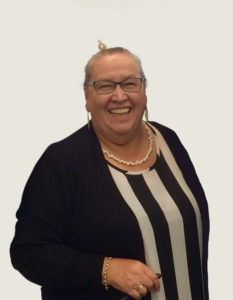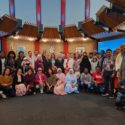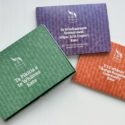E Tū Whānau founding kaiwhakahaere, Ann Dysart (Te Rarawa), passed away on January 28, 2021. Ann was an ethical and visionary public servant who worked relentlessly to give Māori, and whānau of all ethnicities, real power to influence decisions affecting them and their communities.
Her legacy is strong, and it continues. Ma te huruhuru ka rere te manu – Adorn the bird with feathers and and it will take flight.
Ann designed and implemented innovative social sector initiatives that improved the lives of those routinely disadvantaged by our systems, primarily in Māori, single parent, refugee, migrant and Pasefika communities.
In recent years she was known for leading E Tū Whānau, a Māori-designed social change movement that supports people from all communities to create positive change by drawing on their inherent strengths and experiences.

Ann Dysart (Te Rarawa) listened to people, included them in decisions affecting them, and always looked for consensus.
Described by many as a voice for the voiceless in the corridors of power – ‘a small wahine wielding a sharp axe’ – Ann Dysart was a woman of mana and compassion who saw the potential in everyone and was afraid of no one.
She was as loved and respected by communities of all faiths and cultures, as she was by iwi leaders and whānau living in marginalised communities. It was the values, tikanga and aroha of Te Ao Māori, and her strong links with ordinary whānau Māori, that inspired her vision of a just and tolerant society that worked in the best interests of all its members.
Ann Dysart passed away on January 28, 2021, after a long and courageous battle with cancer. She died two days after receiving the prestigious Te Tohu Ratonga Tūmatanui Public Service Medal, acknowledging her outstanding commitment to New Zealand and New Zealanders, and the Public Service Commissioner’s Commendation for 50 years of exceptional service. The ceremony was held at her home with family and close friends in attendance.
It was a well-deserved acknowledgement of a woman who embodied the very best in public service. Ann was a genuine ‘agent of change’.
Ann always understood the complexity of the task in front of her. She never wavered, however, in her belief that authentic systemic change begins in whānau and communities where people are loved, supported and proud of who they are; where people know their worth and know too that their culture and spiritual beliefs are as important, and worthy of understanding and respect, as those of any other group in Aotearoa’s society.
From this bedrock, she believed, people can exercise their responsibility to build the healthy, secure, and violence-free life they want for their tamariki and mokopuna.
Government’s role was to listen to all parts of those communities, not just their official spokespeople, and support them to make the positive changes they knew would work for them. Small changes were just as important as large ones.
Early days
Ann Dysart was born in Titoki in 1951. Her father Ken was Te Rarawa. Her mother, Ruth Reid, was pākeha of Scottish descent. They bought the dairy farm behind the local, family-run store from Ruth’s parents. This is where Ann and her eight siblings were brought up.
As the eldest daughter, Ann was often responsible for the care of her younger brothers and sisters. They remember her as shy but interested in people and the world around her; an avid reader who learnt early to manage and delegate so she could get back to her book as soon as possible.
Their whānau was typical of many mixed-race families of the time. They didn’t specifically prioritise tikanga or talk about Māori values, but they certainly lived them.
Whakapapa and whānau were as much about friends, neighbours and workmates as bloodline. Everyone who came to the door was shown manaakitanga and respected, without judgment, for who they were. The children got a growling if they spoke ill of others. It diminished everyone, their father said, and they were better than that.
Relationships were valued, nurtured and maintained. She observed and listened as her father and his farming mates leaned on tractors and fence posts talking philosophy and current affairs as often as they talked of pasture growth and milk yields.
She was the tamāhine her father regularly took with him on visits to friends and to marae, where they often went straight to the kitchen. She learnt early that was the place to go to find out what was going on and who was doing the real mahi in the community.
Ann left school at 17 for Auckland where she lived at the Māori Girls Hostel and started her public service career as a state services cadet.
Fifty years of exceptional public service
Ann married Garry Baldwin and became a stay-at-home mum following the birth of her son, Scott, in 1974 and, three years later, his sister, Rebekah (Becs). The young family moved to Christchurch before returning north to live in Hobsonville, then Devonport and Whangarei. When Becs was five, Ann went back into the workforce as a receptionist at the Whangarei branch of the Department of Social Welfare during the day, and as a marriage guidance counsellor in the evenings.
Ann’s intelligence, empathy and skill with people was soon recognised, and she was shoulder tapped to spearhead a variety of projects. Each new challenge deepened her understanding of the issues facing people, their societal roots and how to bring about real change in their lives.
By the mid-1980s, she was back in Auckland managing the Staff Development Unit for the Department of Labour’s Employment Service and designing training packages to give unemployed kiwis the skills, confidence and opportunities to get back into permanent employment.
During those years she worked closely with Parekura Horomia, then General Manager of the Department’s Community Employment Group. Together, they explored ways to improve the lives of the unemployed, and Māori in particular.
Community worker Denis O’Reilly began his long professional association with Ann at that time. He remembers her as an integral part of a network of “genuine doers, who worked in different agencies and supported each other, often informally, to get things done.”
“Ann had an intimate understanding of authentic communities and worked hard to get resources to those already showing discretionary effort.”
Denis O’Reilly
He remembers Ann Dysart as humble and pragmatic, a public servant who listened to people, included them in decisions affecting them and always looked for consensus.
In 1993 Ann re-joined the Department of Social Welfare, to design and manage COMPASS, a pilot programme that supported sole-parent beneficiaries back into the labour force, either directly or through education or training.
Her son, Scott Baldwin, says it was her dream job.
“She couldn’t believe her luck. She got to trial a whānau centred approach supporting mainly young parents, most of them women, and Māori and Pacific, with incentive allowances for training and university study.
She was a sole parent herself by then and she knew how hard it could be. She knew the system and saw their frustrations. She made sure they got everything they were entitled to so that they could build safe and happy lives for themselves and their children.”
Once the COMPASS programme was up and running, Ann worked as a contractor on projects that would further develop her whānau and community-centered approach to social change.
Ann Dysart helped make E Tū Whānau a reality
In 2006 Ann Dysart took on the last great challenge of her professional life: managing the E Tū Whānau initiative on behalf of the Ministry of Social Development.
E Tū Whānau was established in partnership with iwi and community leaders to address unacceptable levels of violence within communities and find solutions to a problem with complicated historical and social roots.
In 2007, hundreds of whānau from all walks of life attended hui throughout the country. They spoke of traditional Māori values that elevate wāhine and tamariki as taonga. Their ill treatment within whānau was strictly forbidden. Tāne’s role was to protect and uphold that tikanga.
The nationwide kōrero came down to a belief that by reclaiming those traditional values that strengthened whānau and cultural identity, ordinary people could take responsibility for the wellbeing of their own whānau and hapū. They could take leadership and change what laws and decades of government programmes could not.
E Tū Whānau is guided by the Ministerially appointed Māori Reference Group. Darrin Haimona was its founding chair.
“We asked people to dream of the world they wanted their tamariki to inherit,” he says.
“Ann listened to their moemoeā, helped identify the protective factors that keep families safe and distilled the values that we now call the E Tū Whānau values.
This was a genuine whānau, hapū and iwi led response to problems of violence in our community. It’s a long-term systemic response, and research, which Ann instigated, indicates that it’s working.”
Darrin Haimona
E Tū Whānau is now recognised internationally as a leading indigenous approach to violence prevention and community development.
Ann Dysart connected with communities right across Aotearoa
The E Tū Whānau values and ways of interacting with communities are seen by refugee and migrant communities as coming from a similarly communal cultural world view.
Jenny Janif, a Muslim woman of Melanesian and Indian background, worked with Ann to establish the Settling In programme, an earlier initiative designed to support positive settlement.
“Community leaders knew Ann as someone who listened to them, who focused on their strengths and the things that bring us all together. They saw what she was doing with Māori and wanted to work with their communities and interact with the government in the same way.”
Jenny Janif
Ann Dysart developed strong relationships with members of Aotearoa’s Muslim community. She respected their right to maintain their own spiritual and cultural beliefs within a wider culture largely ignorant of them. These personal relationships allowed Ann and the E Tū Whānau team to offer swift support to their community following the 2019 attacks on the Christchurch mosques.
Naima Ali is a young Somali educator from a refugee background who came of age under the influence of the Settling In kaupapa.
“Ann began working with Muslim communities long before anyone from any other government agency had even approached us. When we needed help, she would help us, but she expected us to get on and do things for ourselves.
She told us – ‘You are all New Zealanders’. She listened to us and believed us when we said that we understood our own people. In this way, she helped stabilize our community and make us confident of our place in Aotearoa.”
Naima Ali
In a career that spanned 50 years, Ann fought institutional racism and inequity with quiet persistence and took on anyone, regardless of stature or professional position, who ignored the rights of those she championed.
She heard people talking of ‘a poverty of spirit’, the burden of a system that told them how to do things and what was good for them. The antidote was to encourage people to dream about the world they wanted to live in and the future they wanted for their tamariki; to look at what they can do for themselves, and regain a sense of control over their lives.
Ann is survived by her son Scott, her beloved moko Emma, her siblings and their whānau. Her much loved daughter Becs died earlier last year from complications associated with multiple sclerosis.
Rere atu rā e te manu rerenga tahi, te kahukura mana nui, te kuaka mārangaranga. Tau atu ki te tāhuna, tau atu, tau atu, tau atu – hī!
Want to know more about E Tū Whānau?
Read about the E Tū Whānau values or browse our resources
Sign the Charter of Commitment and sign up at the bottom of this page for our Pānui



